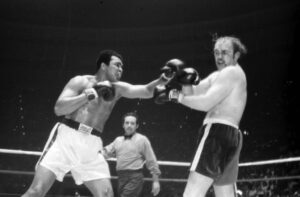Ringside Report Looks Back at Heavyweight Title Challenger “The Bayonne” Bleeder” Chuck Wepner
By Donald “Braveheart” Stewart
The landscape of the heavyweight division is always what fans sweep through and comment upon. Headline names are mentioned as if they are long lost cousins who have just arrived at the family barbecue after having been missing for some time. It is the sweet spot for casual fans where they know names and have opinions about their past.
But those who know, know that the reputations of those superstars are forged in smaller venues, with equally dedicated opponents who have helped them forge their reputations and become the recognized names at the summit of the sport. Those helpers, the ones who have made the names for the special ones are often lost in and amongst the fight reports and the back-page sports stories that many casual observers base their judgements upon.
Chuck Wepner, 35-14-2 14 KO’s, is one such fighter whose reputation requires no introduction to those who know and for those who don’t. It’s a fascinating story.
The Bayonne Bleeder was born just before the beginning of the Second World War, in early 1939 and his professional career has inspired not one, but three films – The Brawler, Chuck and, of course, Rocky. He was the last fighter to face Sonny Liston in a professional ring and was all but 19 seconds away from finishing 15 rounds with Ali. Wepner shares an accolade with Sonny Banks, Henry Cooper and Joe Frazier: along with Wepner, they are the only fighters to floor Ali.
As he was to tell the BBC in one interview, he was born in New York but raised in New Jersey: “I moved to Jersey when I was a year and a half old, after my mother and father split up. My mother raised us here in the projects after that.” His upbringing was tough – amongst the gangsters and dockers, oil workers and players of his hometown. “Where I grew up, there were always two or three gangs,” he told the BBC. “And, more or less you had to go up there and beat up the toughest guy to survive, which I did. I’d have a fight almost every week.”
Wepner was a keen sportsman as a youth he played basketball, managing to get onto the school team as a young man. The cinema was to play a major part in his life early, as he apparently watched the movie Battle Cry and then joined the Marines! He was only 15 years old at the time but convinced his mother to sign his papers.
And that is where the interesting story begins…
Three years after joining the Marines, at 18, he entered the New York Golden Gloves and never, ever looked back. His story involves no fewer than 328 stiches in his career, a nose which got broken 9 times, broad shoulders, knuckled hands and a nickname that was originally an insult, but which became one he adopted because it was so accurate. “I was a big bleeder,” he told BBC Sport.
In 1964 he became a professional and made his debut on the 5th of August in Bayonne against George Coper – another debutant, knocking him out in the 3rd round. The next few years had plenty of ups and downs – including a Madison Square Gardens loss to George Foreman in 1969, which was very keenly felt by Wepner. Then came the big break in Jersey City, on the 29th of June 1970, when he faced Sonny Liston in a scheduled 10 rounder. The fight was stopped in favor of Liston when the cuts on Wepner’s face became too much for him to go on. Sonny Liston never fought in a professional ring again. In 6 months and 1 day, he would be dead.
Liston, who he later credited as the hardest hitter he ever faced was no quick ticket to anywhere as Wepner described to the BBC, “I thought I was gonna take a shortcut. Well, it wasn’t much of a shortcut for me, ’cause Sonny was too big and too tough. He broke my nose, gave me 71 stitches, and cracked my left jaw. I was still chasing him in the 10th round when the doctor stopped it because I was bleeding too much.”
Wepner was suffering after the Liston fight as is described in detail in Shaun Assael’s book, The Murder of Sonny Liston. Wepner had “clinical shock.” He described it to the BBC as “I was in a semi-coma and I was in shock; my doctor told my mother I was pretty banged up. I really thought about whether I wanted to continue. But then I thought, I gotta try, I gotta try again. I gotta give it one more shot.”
Huis next shot was at the Empire Pool in Wembley when he faced Joe Bugner but was forced in the 3rd round to retire due to … cuts.
Then came some belts. He fought unsuccessfully on the 9th of December 1971 in North Bergen against Randy Neumann for the New Jersey State heavyweight belt. On the 15th of April, the following year, in Jersey City, he beat Neumann on points to win the belt. He defended n 1973, in North Bergen against Billy Marquart on the 15th of April on points before taking on and beating, again on points Ernie Terrell in Atlantic City on the 23rd of June 1973 for the National Americas heavyweight title.
It all led to 1975 and his contest with Ali where the WBA and WBC world titles were on the line – the one and only time he fought for them. Wepner was not going to be rich on the back of it as Time Magazine reported that Ali was making $1.5 Million; Wepner $100,000. It was, however, more than he was used to earning. Promoted by Don King – never knowingly undersold – at the Richfield Coliseum, King dubbed it the “Give the White Guy a Chance.” Don King wanted to create a lot of needle and spite, building on the racial differences between Ali and Wepner, but Wepner had too much respect for Ali – “”You know, I was so thrilled and honored to be in the ring with Muhammad Ali. The most famous man ever! I was so proud. Night before the fight, the owner of the Coliseum invites me and Ali to his private box for dinner. A big table and I’m sat right next to Ali. A couple hours sat together talking, he did a few magic tricks. I loved it. I loved Ali. We became great friends.”
Wepner was to take this fight more seriously than any other as he had a full camp and went full time as a boxer for the first time. On the 24th of March, in Ohio, Wepner was to test his preparation
against a legend of the sport. In the 9th round that preparation looked pretty neat as Ali was floored. Legend has it that Wepner spoke to his corner telling them that they were going to be millionaires, only for his corner to tell Wepner that Ali was getting back up and looked none too pleased.
Wepner had come out to win and pressured early on and turned the crowd. Expecting a win for the champ, they were witnessing a very different contest. It was Wepner hearing his name chanted by the crowd rather than Ali and in the 9th, he floored him. What fell was very different to what got back up as he reflected for the BBC, “I could see his eyes and I thought: I’ve really got him angry now! That’s when he started counter punching and swearing at me.” Ali and his corner were unhappy at the knockdown as he claimed with evidence that Wepner had been standing on his foot when he was sent to the floor. But from the 10th round, Ali went on to outbox Wepner, open up cuts on his face and with only 19 seconds of the 15th and final round, the referee called a halt to the contest after a knockdown: it was academic as Wepner was well behind on the scorecards.
What followed for folklore was a film script by Sylvester Stallone – Rocky. Watching via close circuit television, Stallone was inspired – it was an inspiration which was to end up in a courtroom, some time later.
If Wepner’s fame was enhanced by what happened in the ring with Ali, outside of it, Don King was once again working outside of it to maximize the commercial opportunities and that led to Wepner facing Andre the Giant in a fight, he lost by count out after Andre threw him out of the ring. It was clearly a circus event which was part of the entertainment drive of the time of combat sports, though Wepner also ended up fighting a bear twice later on.
But what was becoming increasingly clear was that Wepner had his feet in two camps – legitimate boxing and working as a salesman for alcohol and making a few visits on behalf of friends of his, to lever money from them which was owed to his friends or as Wepner himself said: “I used to go around and ask people politely [about the money they owed] and then maybe I have to smack them in the face or something.”
The fighting career continued, and he faced Duane Bobick on the 2nd of October 1976 in Utica, losing by being knocked out in the 6th round and fought again for the New Jersey State heavyweight title against Scott Frank – with Jersey Joe Walcott as a judge – on the 26th of September 1978 in Totowa – he lost again, this time on points over 12 rounds. He decided to retire afterwards.
Retirement was not kind and issues around drugs surfaced. In 1979 he did not get a job as a sparring partner in Rocky II due to his issues, then in 1985 he found himself arrested on charges that led to a 10-year sentence. He served just over 3 years, then came out on parole. He spoke of how his time had been straightforward, though it appeared to have straightened him out.
It’s been a new century and a new Wepner though the work he had been doing prior to his bout with Ali – in liquor sales is what he went back to after coming out of jail. He was straight, but unhappy and in 2003 sued Stallone for cash as he was the inspiration behind Rocky and in 2006 got a settlement out of court.
It was not the only film associated with Wepner. In 2012 a film about his career was released following a 2011 documentary by ESPN – The Real Rocky. In 2022, he was honored in Bayonne with a statue in Collins Park, a fitting tribute to a truly great legend of the sport.
And of the settlement with Stallone there was little by way of rancor, and in that interview with the BBC, he was to reflect on both his and the statue erected for Stallone, “I was proud of the fact that they put up a statue of Sylvester. He deserved it. And it’s a beautiful statue. I mean, my statue is big, but his? It dwarfs mine.”
And so, the story comes to a point of natural climax – the Bayonne Bleeder, over 6 foot of him, now in his eighties has been honored, despite some checkered history. Just as that one fight with Ali does not define the career, the mistakes made never defined the man. And for that, we are the better for watching any of his fights.
Click Here to Order Boxing Interviews Of A Lifetime By “Bad” Brad Berkwitt



